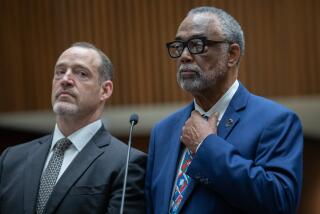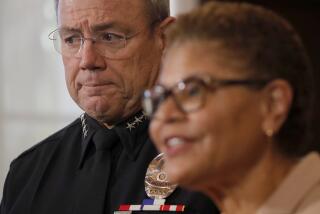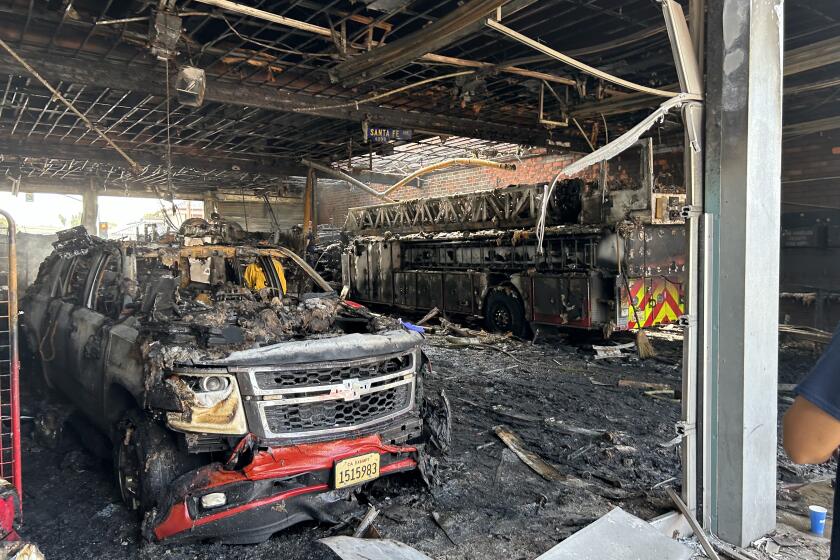Judge questions why Bell’s former police chief isn’t facing corruption charges
From the day authorities handcuffed and led away eight Bell administrators and politicians in a massive public corruption case, people in this small working-class town have wondered why it wasn’t the Bell 9 instead.
Missing in the line-up of defendants — from city administrator Robert Rizzo to the pastor who said his lavish paycheck for serving on the City Council was a gift from God — was the town’s police chief.
For running the city’s 46-person Police Department, Randy Adams made more than the Los Angeles police chief or the Los Angeles County sheriff. His contract, prosecutors said, was drawn up so that citizens would be unable to learn the real size of his paycheck.
Now, the judge who is hearing the case against the Bell 8 is also questioning why Adams is not facing criminal charges along with Rizzo, his chief assistant and six former City Council members accused of draining the city’s budget with oversized salaries and benefit packages.
At a recent routine hearing on the Bell case, Superior Court Judge Kathleen Kennedy surprised attorneys with her statements about Adams.
“I don’t know why he is not a defendant in this case,” Kennedy said, adding later “I don’t make decisions on who is charged, but it does seem rather curious to me.”
The judge continued hammering at the former police chief during a hearing last week, when a defense attorney told the court that Rizzo had selected Adams as police chief because of his reputation for integrity.
“That is not a man of integrity,” the judge shot back. “This is not the man who is going to clean up the Police Department.”
Deputy Dist. Atty. Max Huntsman said in court that “it was our assessment and still is our assessment that there isn’t enough evidence to make a conviction beyond a reasonable doubt likely as to Adams.”
In an interview with The Times, Huntsman said it was more difficult to build a case against Adams than against the other officials because Adams was not a Bell employee when he signed his contract. Huntsman also noted that unlike the eight Bell officials charged, Adams didn’t control the city’s purse strings. For that reason, proving that Adams defrauded the city — or intended to defraud the city — would be a challenge, he said.
Investigators in the district attorney’s office concluded that they couldn’t win a conviction against Adams, Huntsman said. When prosecutors took the case to the grand jury, the main targets were Rizzo and his chief aide, Angela Spaccia, not Adams.
“Not to say he is innocent,” Huntsman said.
Adams’ attorney, Thomas O’Brien, said Kennedy’s comments didn’t bother him. “If the judge questioned the prosecutor about their internal deliberations and the answer was insufficient evidence of crime, it doesn’t worry me,” he said.
Even though he was not indicted, Adams is at the heart of some of the criminal charges against Rizzo and Spaccia.
The two administrators are accused of trying to hide Adams’ oversized paycheck by dividing it into two contracts, making it nearly impossible to determine how much he was earning.
His contract as police chief paid Adams $200,000 a year, but he earned $257,000 more as special police counsel. Prosecutors contend that if someone had asked how much the police chief was making, the response would have been a document that showed Adams was receiving less than half his true salary.
According to grand jury testimony, Adams signed the contracts in 2010 after meeting with Rizzo, although they were backdated to 2009, and the council did not approve them. Adams became Bell police chief in July 2009 after signing a contract for $457,000 a year.
The indictment also alleges that Spaccia and Rizzo hid an agreement that allowed Adams to retire with a disability pension, a deal that would have allowed him to avoid paying taxes on half his pension.
Until the scandal in Bell erupted in the summer of 2010, Adams was set to retire with an annual paycheck of more than $400,000, which would have made him the third-highest-paid public pensioner in California. After his contract in Bell was determined to be invalid, his annual retirement was cut to $268,175, with no tax break.
A 37-year law enforcement veteran who had been chief in Simi Valley and Glendale, Adams was hired to take over the much smaller police force in Bell at a salary 50% higher than what Los Angeles Police Chief Charlie Beck and Los Angeles County Sheriff Lee Baca earned.
“It doesn’t make any sense for a police chief in a town of 37,000 to have a salary at that level and a preapproved disability pension,” Kennedy said during one hearing. “That’s appalling.”
In a 11/2-page explanation of his involvement in the southeast L.A. County city, titled “The Police Chief’s Side of the Story on Bell,” Adams said he wanted to be paid the equivalent of his pension and what he could make in short-term stints as an interim chief. When Rizzo made his offer, Adams said, he thought it was “too generous.”
During Adams’ negotiations with the city, there were hints all was not right in Bell. Adams noticed that his contract did not specify the length of a pay period, according to records. In a May 27, 2009 email, Spaccia explained to him: “We have crafted our Agreements carefully so we do not draw attention to our pay. The word Pay Period is used and not defined in order to protect you from someone taking the time to add up your salary.”
In a lawsuit he filed against Bell for his legal fees, Adams revealed that as he was negotiating his contract, he contacted the district attorney’s office “to inquire as to the propriety of the city’s offer” and was “encouraged” to accept it.
In an email to prosecutors, Spaccia’s attorney, Harland Braun, said the chief told his client that Dist. Atty. Steve Cooley advised Adams to take the job, and that he “knew of no problems in Bell.”
But Huntsman told the judge that he had heard second-hand that Adams had talked to a district attorney’s investigator, not a prosecutor.
“He didn’t talk to Cooley or any D.A., and nobody reviewed the contract and nobody met with Spaccia or Rizzo and said that contract was lawful,” Huntsman told The Times.
Huntsman acknowledged that the grand jury heard damning evidence about Adams, but he said that didn’t tell the whole story.
“If you just look at the transcript of the indictment, it sure looks like, gosh, we could have indicted Randy Adams,” he said. “The answer is we know more than that, and we’re not sure we’d win at trial.”
More to Read
Start your day right
Sign up for Essential California for news, features and recommendations from the L.A. Times and beyond in your inbox six days a week.
You may occasionally receive promotional content from the Los Angeles Times.







